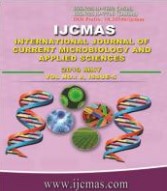


 National Academy of Agricultural Sciences (NAAS)
National Academy of Agricultural Sciences (NAAS)

|
PRINT ISSN : 2319-7692
Online ISSN : 2319-7706 Issues : 12 per year Publisher : Excellent Publishers Email : editorijcmas@gmail.com / submit@ijcmas.com Editor-in-chief: Dr.M.Prakash Index Copernicus ICV 2018: 95.39 NAAS RATING 2020: 5.38 |
Root knot nematode Meloidogyne enterolobii cause considerable yield losses in guava. It is now an emerging menace in guava production. Many authors reported the resistant nature of Psidium cattleianum against M. enterolobii. P. cattleianum is a small tree or shrub with a smooth bark and leaves are obovate elliptic and glabrous. Fruits are round, having good aroma with sweet taste. The fruits of Psidium gujava are big in size, round, smooth skin, white or pink flesh, soft, firm, light yellow, pleasant flavor with few seeds. Mechanisms of resistance against M.enterolobii in guava are studied by taking microtome sections of infected root tissue of P. cattleianum and P. gujava. The results revealed P. cattleianum did not developed any resistant reaction against nematode infection, giant cells are found to develop normally. The number of giant cell formed is less when compared to P. gujava. In P. gujava giant cells were thick walled, multinucleated with rich cytoplasm. The giant cells in P. cattleianum appeared to be disrupted and with less dense cytoplasm. No complex galls or group feeding of nematodes was observed in P. cattleianum. Development of nematodes was seems to be hindered. Smaller females are observed in resistant species when compared to P. gujava species.
 |
 |
 |
 |
 |